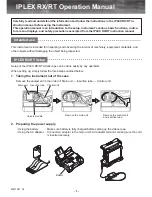
Signet 4150 Stilling Chamber
with automatic air release valve
3-4150.096 Rev C 09/13 English
*3-4150.096*
Description
The Signet 4150 Stilling Chamber is used to remove air bubbles
from the fl ow stream before it passes through the measuring
cell of the Turbidimeter. Air bubbles will cause unstable or
incorrect readings if not eliminated from the fl ow stream.
The stilling chamber is a cylinder approximately 5 cm x 66 cm
(2 in. x 26 in.). Water enters the chamber via the outlet fi tting
near the top of the cylinder (see fi gure 1). As it passes through
the chamber, the fl ow velocity is reduced by the larger volume
of the chamber. This allows time for any entrained air to rise to
the top of the cylinder, where the automatic air vent releases it
into the environment.
For proper operation the stilling chamber must be mounted
lower than the sensor. For optimum results there should be at
least 76 cm (30 in.) as measured from midpoint of the air vent
to the inlet at the sensor.
The air vent has a maximum working pressure of 6 bar (90 psi)
and maximum temperature range to 106 °C (225 °F).
Pressure
Regulator
MINIMUM 76 cm (30 in.)
Inlet with
aerated water
Outlet with
clear water
3-4150 Turbidimeter
66 cm
(26 in.)
24 cm
(9½ in.)
5/16 in. O.D. x 3/16 in. I.D. Tubing
DESSICANT COMPARTMENT
OPEN ONLY FOR MAINTENANCE
Operating Instructions
Braukman Automatic Air Release Valve
1. Before fi lling the chamber, make sure the red vent cap is securely tight
and that the release valve is in the closed position (see fi gure 2) by
turning valve body clockwise. HAND-TIGHTEN ONLY to avoid damaging
the valve.
2. With the valve in the closed position, fl ush the system as required to
remove dirt, debris and contaminates.
3. Fill the system with the appropriate solution.
4. Start operation by turning the air release valve body counter-clockwise to
the open position (see fi gure 2).
5. For proper operation, make sure that the red vent cap is tightened all the
way to the stop position.
HAND-TIGHTEN
ONLY.
Figure 2 Shown in
Open Position
OPENED
CLOSED
Fig 1




















